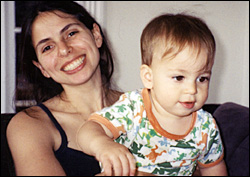|
 | Philip Sanford (Sandy) Zeskind, Ph.D., Director, Neurodevelopmental Research, Department of Pediatrics, Carolinas Medical Center. Photo courtesy of Sandy Zeskind
|
Dr. Sandy Zeskind views the safety data in a different light.
"Studies that have found no adverse effects of moms taking SSRIs during pregnancy," says Zeskind, "are really based on whether the baby is low-birthweight, or premature, or if there are gross physical anomalies and those are the kinds of measures that, quite honestly, are the same ones that ancient Sparta used to determine whether a baby was healthy or not."
Zeskind directs neurodevelopmental research at Carolinas Medical Center in Charlotte. He testified before the FDA advisory panel that although SSRI-exposed babies may look like healthy, full-term babies, when closely observed right after birth, they display subtle neurological problems.
"What we found was that babies whose moms used SSRIs during pregnancy were significantly more tremulous," says Zeskind. "They had these nervous shakes much more than other babies. They also startled more."
But Dr. Cohen of Mass General sent a letter to the FDA as a consultant for Prozac-maker Eli Lilly, pointing out these symptoms in newborns also show up in babies whose mothers were depressed and not on medication.
"Until we have studies of women who are well and taking the antidepressants," says Cohen, "It's hard to tease out effect of being on medications and effect of depression."
 | Helen Kim, psychiatrist, Hennepin Women's Mental Health Program in Minneapolis Photo courtesy of Helen Kim
|
In the face of this uncertainty, pregnant women need to make choices.
Psychiatrist Helen Kim counsels patients daily at Hennepin Women's Mental Health Program in Minneapolis. She tries to put the FDA warning in the context of the woman's own history of depression.
"Ultimately, when you are face to face with a woman struggling with depression or anxiety during or after her pregnancy, her experience of illness is, I think, the most important determinant of the right thing to do. I can have the same conversation with room full of women and they'll make different decisions based on own perception of risk," explains Kim.
Women must also decide what do to about medication in the post-partum period, particularly if they want to breastfeed. The American Academy of Pediatrics says the effects of antidepressants on nursing babies are unknown, but may be of concern.
But forgoing treatment could mean exposing a baby to depression in his or her first crucial relationship.
 | Watch excerpts from two of the videos filmed by Ed Tronick.
|
Ed Tronick, a developmental psychologist at Harvard University, has spent 30 years filming the moment-by-moment interactions between depressed mothers and their babies.
Tronick narrates a video: "The mother is reaching to take the baby's hand and the baby's pulling her hand away. Now here's a smile, and but when she smiles, the baby's looking away so she goes flat again. It's almost like she gives up on the interaction."
The baby cries and the mother tries to soothe the child.
Over time, the missteps add up. Tronick says the baby displays sadness and irritability and starts to take on the mother's depressed affect. He says he's come to see depression as a communicable disease, transferred by a mother's communication to her baby.
 | Amy Newell and her son Ari. Photo by Sasha Aslanian
|
Amy Newell, a 29 year old mother in Brookline, Massachusetts is trying to spare her one-year old son Ari her history of depression. She's concerned about his vulnerability to what she calls the black hole of depression so she's vigilant about taking care of her own mental health.
"Every mood that I have," says Newell, "Ari gets to share. I don't think that means that I have to be happy all the time, but I means that I have to model good management of my moods. And I try to plan for what would I do if I had a major depressive episode again because obviously my first priority would be to insulate Ari as much as possible from the effects of that."
Since ten-percent of pregnant women suffer from depression, experts in the field of perinatal psychiatry say finding better ways to insulate children from depression, as well as medication, is a top priority.
Back to Suffering For Two
| 
